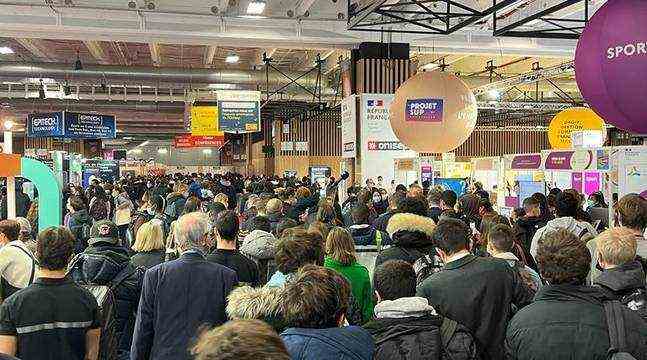A must for high school students, guidance fairs are making a big comeback this year after a year and a half of virtual meetings due to the health crisis. And until March (except restrictions due to the fifth wave of Covid-19), they will flourish in all the major cities of France. This is an opportunity for high school students to attend conferences, to meet training managers and students on the stands, to take documentation, to consult psychologists. from National Education, specialists in student guidance … And for students, it is often a question of finding information on a master’s degree, an Erasmus trip or planning for a future profession.
In some large cities, the number of educational fairs is significant. So, it’s not easy to know which ones to visit. There are several types. Generalists, who present a large panel of higher education courses, offer conferences on trades, further studies, bac specialties, etc. And specialists: on grandes écoles, the field of health, apprenticeship, artistic training … “Generalist fairs are recommended for young people who do not have a well-defined orientation project, because the training offered is exhaustive,” explains Sébastien Mercier, deputy director of development at theStudent. Ditto for those who hesitate between two courses, for example an engineering school and health studies. Specialized exhibitions are recommended for those who already have a well-planned project, because the exhibitors and the conference program allow you to dive into the heart of the subject ”.
Above all, do not come as a tourist
Parents also wonder about the age at which a visit can be profitable for their offspring: “You can go to a salon from the 2nd grade in order to choose the 1st grade specialties. This makes it possible to develop its strategy for Parcoursup ”, indicates Sylvie Amici, president of the Association of psychologists and psychology in national education (APsyEN). Another recurring question: should you visit a salon with your class, with your parents, or with friends? “I recommend that the students go there with one of their parents, because it allows a moment of family exchange around the orientation project, which is so important. And also to disperse less! », Continues Sylvie Amici. But that does not mean that it is up to the parents to make the choice of training. “Because the student must remain an actor in his plan for the future,” insists Sébastien Mercier.
But it is clear that for some visitors, the experience was not fruitful. Like Alexia, who answered our call for witnesses: “Nothing concrete and too many people to be able to communicate”. Hence the interest in preparing your visit well in advance. “We must avoid wandering in the pits because it is not productive and can even be destabilizing,” comments Sylvie Amici. Onisep offers a very effective educational kit to prepare for your visit. “The ideal is to go to the exhibition presentation sheet on the Internet to consult the list of exhibitors and the conference program, in order to set priorities”, recommends Sébastien Mercier. For the pupils who do not know what to do, it is recommended to plan a first stop at the stand of the psychologists of the National Education: “They will be able to give the pupils first references on the courses likely to interest them, even if they do not. will not be able to monitor their project. This work will be carried out in high school, ”explains Sylvie Amici.
Keep a critical mind
Another important point to take into account: the strong representation of private establishments on numerous forums. Even if the organizers of regional exhibitions are forging partnerships with local rectorates and universities. This is the impression that Marc felt: “The salons are only used to promote large private schools where you pay for your diploma. There aren’t really any professionals present (other than the army and police stand) ”. Hence Sylvie Amici’s recommendations: “Schools buy themselves visibility during trade fairs, with the idea of attracting new students. It is therefore important to ask certain questions: do their training courses issue diplomas recognized by the State? Have they obtained the National Education visa? Are they registered in the national directory of professional certifications (RNCP)? These elements can have an impact on the possibilities of continuing studies and on the quality of professional integration. The school should also be asked about its date of creation, the number of students enrolled in the first year, the number who pass the diploma and the number of young people who pass the exams. This makes it possible to know if a lot of students have left along the way ”. And even if a school caught the eye of a young visitor, he had better not rush: “The show seals the first meeting with an establishment. But it’s good to then attend an open house to confirm or not your first impression, ”advises Sébastien Mercier.
By taking all these precautions, a visit to an orientation room can really open up horizons, as was the case for Michel: “After two years of university where the courses came out of the Paleolithic, I went to a forum of orientation. I crossed paths with students from a new computer science school and signed up. I graduated in the Web sector, where employment is promising. So yes, these forums can change lives, ”he says.

